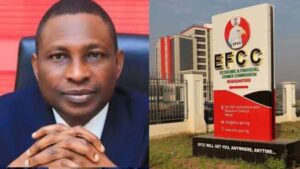The Chairman of the Economic and Financial Crimes Commission (EFCC), Ola Olukoyede, has disclosed that a preliminary investigation into the Nigerian National Petroleum Company Limited (NNPCL) has uncovered staggering levels of corruption.

Speaking on Wednesday at the third day of the National Conference on Public Accounts and Fiscal Governance in Abuja—an event organised by the Public Accounts Committees of the Senate and House of Representatives—Olukoyede described the findings as deeply troubling.
“In the past three weeks, we launched a comprehensive investigation into the extractive sector, especially oil and gas. What we’ve seen so far is alarming,” he said. “We’ve only just started reviewing the records, and already the level of financial malpractice is overwhelming.”

The revelation comes months after President Bola Tinubu removed Mele Kyari as Group Chief Executive Officer of NNPCL, replacing him with Bashir Ojulari. Kyari had held the position since 2019.
Olukoyede warned that the corruption uncovered in the oil and gas industry was only a glimpse into broader systemic financial mismanagement, which he believes fuels Nigeria’s economic instability and growing insecurity.
“There’s a direct link between poor management of public resources and the insecurity we face—be it terrorism, kidnapping, or banditry. These crimes are often funded with diverted public funds meant to improve lives,” he explained.
Call for Legal Reforms
The EFCC chairman also urged lawmakers to pass the Unexplained Wealth Bill, which would empower the Commission to act against individuals in possession of assets grossly disproportionate to their known incomes.
“I’ve been appealing for this bill for over a year. It was rejected by the last National Assembly. If we can’t hold people accountable for their unexplained wealth, we’ll never win this fight,” he said.
Giving an example, Olukoyede said: “Someone works in a ministry for 20 years, and after calculating their total earnings, we find they own five high-end properties—in Maitama and Asokoro. Yet, we’re told to prove a predicate offence first. That’s unreasonable.”

Global Hunt for Stolen Assets
He also revealed that the EFCC is actively tracing looted assets across multiple countries, including the United States, Turkey, and Iceland.
“Just last month, I travelled to four or five countries in pursuit of Nigeria’s stolen wealth. An ambassador even told me they discovered an estate in Iceland owned by a Nigerian. Iceland, of all places!” he exclaimed.
Despite these efforts, Olukoyede admitted that even the most efficient anti-corruption agency would be unable to recover more than half of Nigeria’s looted funds, due to lack of cooperation from foreign custodians.
“No matter how much capacity we build, we won’t be able to recover even 50% of what’s been stolen. Foreign governments holding these assets often don’t want to release them,” he lamented.
He criticised these foreign nations, accusing them of complicity: “Under international law, anyone who harbours stolen assets is just as guilty as the thief.”

Domestic Challenges and Cultural Barriers
Olukoyede decried the culture of impunity in Nigeria’s public sector, where corrupt officials are often celebrated despite overwhelming evidence of wrongdoing.
“We show the evidence, trace the funds, and prosecute in court—yet these same individuals are celebrated publicly. How can we claim to be serious about fighting corruption?” he asked.
He also pointed out that over 700 federal Ministries, Departments, and Agencies (MDAs) still operate without effective internal controls. He questioned the National Assembly’s capacity to properly monitor such a vast network without strong compliance systems.
“We can’t read every file or audit every account. What we need are robust internal structures to proactively check corruption before it spreads,” he said.

A Nation at a Crossroads
According to Olukoyede, an EFCC report presented during his Senate screening revealed that 90% of public funds looted within a year were transferred abroad—money he said could have transformed Nigeria’s education and healthcare sectors.
“We shouldn’t need to borrow to survive, given our natural wealth. That money could have built schools, hospitals, and supported millions of Nigerian students,” he stressed.
He called for unity among political leaders and stakeholders to confront corruption head-on, warning that the current administration may be Nigeria’s final opportunity to correct decades of financial mismanagement.
“If we can execute just 60% of our capital budget effectively in 2025 and 2026, we’ll empower small and medium businesses, develop infrastructure, and reposition the country,” he said. “What we need is transparency in revenue and accountability in spending.”
Olukoyede urged lawmakers and citizens to ignore distractions from vested interests and online critics: “This isn’t about politics. It’s about saving the soul of Nigeria.”




